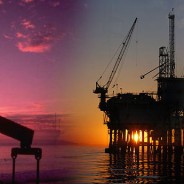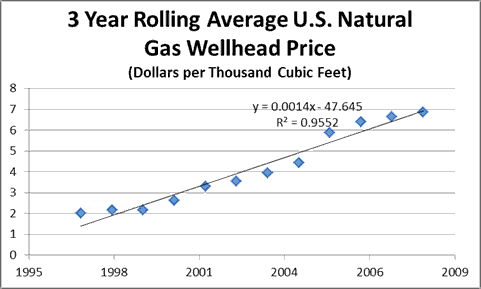Shale Gas Revolution adds $193 Billion to the US Economy

The naysayers and those who want shale gas to go away have not seriously looked at the benefits of lower natural gas prices to the US economy. In this blog, I decided to evaluate the savings the shale gas revolution has given to the US economy. As I have been espousing, energy is just a means to an end. Reducing energy cost, immediately increases value to society. The inverse is also true.
In order to calculate the value of the shale gas revolution, I looked at the natural gas price trend on a three year rolling average from the EIA. I started in 1997 and stopped the graph in 2008 right before the shale revolution presented itself. Interesting to see the three year rolling average price is quite linear with an R^2=0.9552.
Obviously extracting the equation for future years is a plausible method to calculate the price of natural gas without shale gas. However, there are concerns with that method in that eventually prices do hit a plateau as alternative uses and demand response do occur. A cautious and conservative calculation is to assume the price of $7/mmbtu.
With this price, we can cross multiply the consumption and compare the cost to the US economy with or without shale gas. I know one of the first comments would be higher gas prices would have lowered consumption. I will agree with that in principle. However, did you know from 2002 to 2008 gas demand rose in the midst of the largest sustained gas price rise of over 270%? This growth came from the fact the incremental demand of power had to be met. Since the US did not build any significant baseload generation outside gas units over the past 10 years it was left to gas units to fill the gap. The price of electricity is small when compared to the value it can bring therefore a 270% rise in gas price was not going to stop gas demand. In reviewing my math in the table below, I took a conservative view and held demand at 2009 levels in the case of without shale gas.
| With Shale | Without Shale | ||||||
| Wellhead Price | US Demand | Cost of Gas | Wellhead Price | US Demand | Cost of Gas | US Savings | |
| $/MCF | MMCF | $Billion | $/MCF | MMCF | $Billion | $ Billion | |
| 2009 | 3.67 | 22910078 | $ 84.08 | 7 | 22910078 | $ 160.371 | $76.291 |
| 2010 | 4.48 | 23775388 | $ 106.514 | 7 | 22910078 | $ 160.371 | $53.857 |
| 2011 | 4 | 24466323 | $ 97.865 | 7 | 22910078 | $ 160.371 | $62.505 |
| Total | $192.653 |
With the shale gas revolution, the US saw a stimulus to the tune of $193 billion over the last three years. The $193 billion savings to the US economy is conservative in the fact without shale gas more money would have been expatriated via LNG if it were not for shale gas. To put this number in perspective I reviewed the Recovery Act spending. In the grand scheme $193 billion compared to the total Recover Act of $840 represents 23%. On several individual parts of the Recovery Act, shale gas savings dwarfed many categories (e.g. Unemployment benefits $61 Billion, Infrastructure $24.5 Billion, Energy Incentives $10.8 Billion, Housing $5.5 Billion).
The industry needs to learn how to extract and educate the public on the value it has produced for society. Innovation and hard work produces more return and more transparent stimulus to society than any government program could ever create.
I do agree and support the regulation of the industry to limit the amount of bad actors that are willing to cut corners and sacrifice the environment for small increments. Our recent significant problems (Accounting Scandals to Housing/Banking to Oil Spills) can be blamed on the actors directly involved, but there is much blame to be placed on the appointed regulators for each of those industries. Regulatory capture has been and continues to be a constant theme in these economic woes. More rules do not solve the problem; we need better regulators to enforce existing laws and apply common sense.
The administration should thank and embrace those who created and produced this shale gas revolution, as the economy could be $193 billion worse and rising each year.
I have been prescient in forecasting economic calamity and the impact on the major commodity markets (Forecasted both the 1998 Asian Financial crisis and the recent financial crisis and the drop in the major commodity markets in each case).
We positively and evocatively challenge the current thinking involving any aspect of energy use. We look for projects that offer meaningful, transformative, with impactful outcome to the marketplace or society (see projects).
Please consider All Energy Consulting for your consulting needs.
Your Energy Consultant,



0 Comments
Trackbacks/Pingbacks